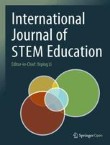Speed
48 days to first decision for reviewed manuscripts only
29 days to first decision for all manuscripts
188 days from submission to acceptance
32 days from acceptance to publication
投稿信息
稿件收录要求
Aims and scope
The International Journal of STEM Education is a multidisciplinary journal in subject-content education that focuses on the study of teaching and learning in science, technology, engineering, and mathematics (STEM). It is being established as a brand new, forward looking journal in the field of education. As a peer-reviewed journal, it is positioned to promote research and educational development in the rapidly evolving field of STEM education around the world.
The International Journal of STEM Education provides a unique platform for sharing research regarding, among other topics, the design and implementation of technology-rich learning environments, innovative pedagogies, and curricula in STEM education that promote successful learning in Pre K-16 levels including teacher education. We are also interested in studies that address specific challenges in improving students’ achievement, approaches used to motivate and engage students, and lessons learned from changes in curriculum and instruction in STEM education. The journal encourages translational STEM education research that bridges research and educational policy and practice for STEM education improvement.
The journal values unique contributions of different perspectives that view STEM education either as traditionally defined, subject-based education in S.T.E.M. separately, or as an educational undertaking in inter-connected STEM fields. It features original research and research reviews in STEM education. Interdisciplinary research contributions are preferred.
There are no methodological restrictions, but this journal aims to foster multi-disciplinary research and development through contributions that are empirically grounded and blend subject content expertise and educational endeavors. Contributions will be encouraged from scholars within and across subject content fields (e.g., science, technology, engineering, and mathematics) and social science fields (e.g., education, psychology, and sociology) to promote scholarly exchange and discussion on emerging issues and frontier research in STEM education. The journal also features short reports that present case studies or showcase evidence-based changes in STEM curriculum or pedagogical practices in different education systems around the world.




